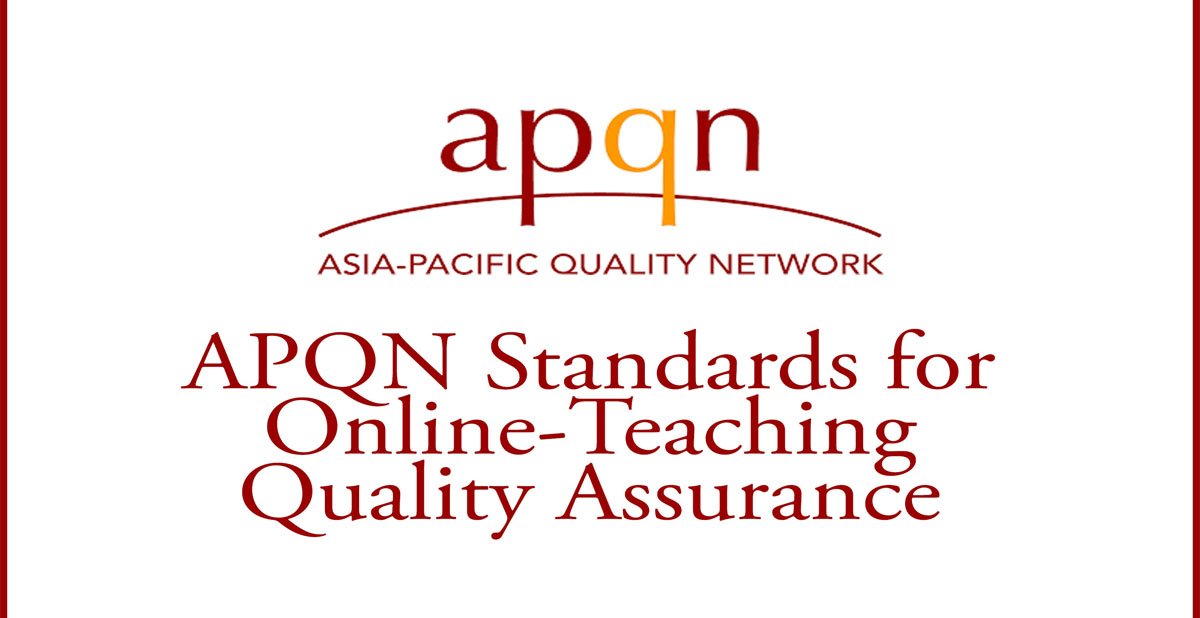APQN Sets Standards for Online-Teaching Quality Assurance
In the past year (2020), in campus lockdown restrictions as a result of the COVID-19 pandemic, online teaching has emerged onto the global higher education stage as a leading means of “adjusting to new environments” which suggests becoming a “disruptor” in higher education where operations are typically embedded in historical constancy. Naturally, the definition of “quality” in higher education (HE) should be redefined amidst the rapidly changing expectations and conditions brought on by 2020. The question is how do internal quality assurance (IQA) and external quality assurance (EQA) monitor newly online teaching provision in higher education and develop future provision in a reliable and efficient manner? What is the quality of online courses and what are the outcomes of such training? Can we trust the quality of online education and the qualifications of graduates who have been trained online? The results of “APQN survey on COVID-19 impact in Higher Education Institutions” conducted from March to May in 2020, shows 68% of the respondents are “not satisfied” with online teaching, while “APQN Survey on Effectiveness of On-line Teaching” conducted in July in 2020, shows 34% respondents think online teaching is “inefficient”. At APQN 8th forum entitled “Influence of COVID-19 on Higher Education Quality Assurance” held on July 28 in 2020, an urgent demand made APQN decided to develop APQN Standard for Online-Teaching Quality Assurance. After the key elements of standard for online-teaching quality assurance were developed by Delphi Method at the beginning of 2021. Based on the Survey on “APQN Standard for Online Teaching Quality Assurance” was conducted in April, here is the final version of “APQN Standard for Online-Teaching Quality Assurance”, endorsed by the 6th Board of APQN. The principles includes 5 aspects: (1)information principle; (2) "teaching by learning" principle; (3) development principle; (4) validity principle; (5) objectivity/evidence principle. Based on 5 principles, the indicators consist of 14 key features: (1) service, openness, sustainability in criterion 1 embodies “information principle”; (2) teaching design, teaching process and teachers’ ICT literacy in criterion 2 and “learning process”, “learners’ ICT literacy” in Criterion 3, embody "teaching-by-learning principle”, (3) objective achievement and satisfaction in Criterion 4 embodies “development principle”;(4) assessment method, assessment mechanism and quality improvement in Criteria 5 embody “validity principle”; and (5) objectivity principle is applied to all 5 criteria. In order to realize the for missions of “Enhancing the Quality of Higher Education in the Asia-Pacific Region” and the final goal of "Dissolving Boundaries for a Quality Region", APQN aims the following 3 aspects: (1) to develop quality criteria for online teaching for HEIs and non-traditional HE providers; (2) to develop a PDCI (plan-do-check-improvement) plan to maintain quality standards for online teaching in HEIs and non-traditional HE providers; (3) to develop a feasible and efficient action plan to implement high-quality online teaching.

